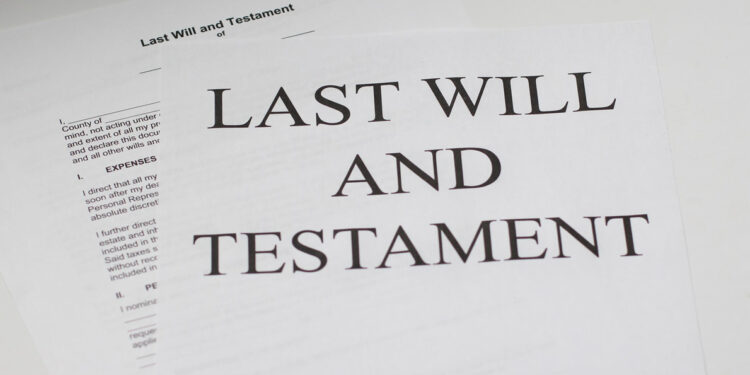What Rights You Have as the Beneficiary of a Will?

A loved one’s passing is a stressful enough situation as it is, but following their death, there is the inevitable challenge of managing their estate and will. As the beneficiary of a will, you are entitled to an inheritance from the person’s estate.
Beneficiaries are named in the will by the testator and are either entitled to a specific asset, cash amount, or a share of the estate as a whole. Sometimes, people pass without leaving a will. In this case, the heirs of the estate are identified by the Rules of Intestacy and are entitled to a share of the estate.
But how do you know if you are a beneficiary of a will? And what are your rights as a beneficiary? Read on to find out more.
How Do You Know if You are Named in the Will?
During their lifetime, the writer of a will is under no obligation to share the document’s contents with anyone. However, in reality, the deceased will typically discuss what they intend for their estate upon passing with executors and beneficiaries.
The testator might choose not to share the contents of the will with the beneficiaries during their lifetime. Therefore, it can be difficult for some people to know whether they have been included or not. If this is the case, you will not know whether you are a beneficiary of a will until after the individual has died.
The executor has a legal obligation to identify and notify any of the named beneficiaries in the will. They must also notify an heir of their entitlement to inherit assets from the estate. Therefore, if you believe you have been named in a will, the executor will name you in due course.
However, if you are concerned that you have been named in a will but have not received any notification from the executor, you can request that the estate’s executor confirms the current state of affairs. To do this, you should make your request formally in writing. You have a legal right to know whether you were named in the will, so if you are a beneficiary, the executor will respond with information about your right to inherit from the estate and what you are entitled to.
If you have not been named in the will, then it is up to the executor’s discretion whether or not they will contact you.
Can You Be Removed From the Will as a Beneficiary?
A beneficiary can be removed from the will by the testator at any point. The testator is the person who writes the will, and they can remove a planned beneficiary or update their inheritance through a codicil.
A codicil is an additional document that a testator can use to modify their will. It can be used to make changes, explain points or revoke a specific part of the will. It needs to be signed and witnessed in the same way that the will itself is.
Additionally, a testator can choose to write an entirely new will if they desire. If anyone is added or removed from the document, the writer is under no obligation to inform those parties. With that being said, it is generally recommended that testators keep executors and beneficiaries updated about any changes. Otherwise, there can be confusion and potential conflict when they pass away.
Can You Challenge the Will?
Beneficiaries have the right to challenge the will of a deceased individual if there are sufficient grounds to do this. Generally, establishing grounds for a challenge involves determining whether the testator had sufficient mental capacity when writing the will, was under duress or was being influenced, or had limited understanding of what they were doing.
If you are concerned that this could have been the case, then you should ideally make a claim as soon as possible. Otherwise, you risk the executor gaining probate and beginning the distribution of the inheritance. This can make challenges much more convoluted.
As a beneficiary, you have the right to challenge a will before probate has been granted using a document known as a caveat. This document is filed in court to stop the estate’s executor from obtaining possession to distribute assets. A caveat can be used if you believe the testator was of unsound mind when writing the will but shouldn’t be employed as a means to challenge the will’s contents.
Can You Dispute the Administration of a Trust?
Trust disputes are challenges related to the administration or validity of a trust. Often, trusts are set up as part of the will to pass assets on to the family or loved ones of the deceased individual.
Disputes can arise over the value of the assets in a trust, the interpretation of the stipulations set out in the trust, conflict between beneficiaries, or the removal of beneficiaries. As a general rule, family trust disputes require the intervention of solicitors specialising in trusts to resolve them.
If you are aware of a breach in the trust conditions or are concerned that the trustee is not acting in your best interests as a beneficiary, you are entitled to dispute the management of the trust. However, understanding how to contest a trust or a trustee can be challenging for those without the required expertise. As a result, look for experienced trust solicitors to help you with your claim. For example, Hugh James are experienced trust dispute solicitors who will support you during the challenge.
How Long do Executors Have to Pay Beneficiaries?
The law sets a standard known as “the executors year”, which allows the estate’s executor up to a year to assess the estate, obtain probate, pay off liabilities and collect the assets.
During this year, the executor is under no obligation to distribute any of the assets the testator left upon passing. This law is designed to give the executor sufficient time to handle the affairs properly. If they are forced to rush the distribution of assets, they risk making mistakes.
This could have severe consequences for the executor, as if they are found to have made poorly judged decisions, they could be held personally liable for the mistake. Therefore, executors generally hold off on the distribution of assets until after all liabilities and unsettled debts are paid off. The time this takes differs from person to person and also depending on how complicated the estate is. This can sometimes lead to the distribution of assets taking more than a year.
Conclusion
In summary, the distribution of a loved one’s estate after their death can be a drawn-out and complex affair. As a beneficiary, you might need to wait upwards of a year to receive your inheritance, but more often than not, it will not take that long.
As a beneficiary of a will, it is important to understand your rights and obligations to avoid confusion during the process. While it is common for the testator to discuss their intentions with the executor and their beneficiaries, it is not an obligation.
Therefore, you might be unaware of your entitlement. However, if you are named in the will, the executor is legally required to let you know in a reasonable timeframe, so you shouldn’t be out of the loop for long.










